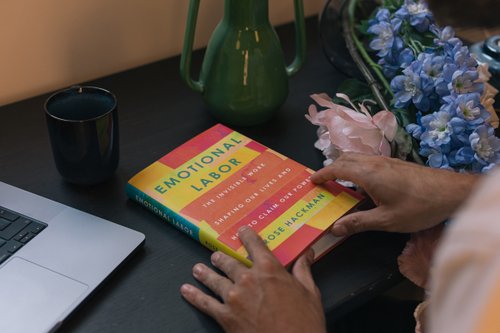I've been forced back into the office – and it’s stressing me out
Jul 27, 2022
5 mins


Journalist
As companies across America call staff back to the office, many are finding the process stressful. There are new routines to get used to, worries about health risks, and a changed office environment to navigate. But is this just a transition phase? Will we soon happily adapt to our office-bound ways again, or is the stress here to stay?
With admirable flexibility, employees across America answered the call to start working remotely in 2020 as fears of the coronavirus spread. Laptops were propped open at kitchen tables, on sofas, and even in beds. We learned to use Zoom, Slack, Teams and all the other apps that help us to stay in touch with colleagues and do our work.
Now the tide is turning. Some large firms, such as Google and Apple, want staff to turn up three days a week. Others, such as Goldman Sachs, have told workers they have to return to the office at least five days a week. But after getting a taste of remote work, many employees, including more than half of those at Goldman Sachs, don’t want to go back to the way things were. In a February 2022 survey for Pew Research Center, most teleworkers in the US said they worked from home by choice, not out of necessity, and 78% said they would like to continue to do so after the pandemic ends.
Being forced to go into an office can be worrying. US knowledge workers who’ve been called back into their offices reported high levels of work-related stress in early 2022, particularly those who had returned to full-time attendance.
Samantha, who is in her 40s and works for a not-for-profit agency in Atlanta, has struggled with the transition. She has been back in the office since January, but it rankles the staff who didn’t have a say in the decision. “It went from ‘Let’s try one day,’ to ‘Let’s try two,’ and then very quickly, from two to three.” Her commute is a two-hour round-trip. “I have to get up an hour and a half earlier than I normally would to get ready and make the commute; that’s been a great stress,” she says. “That time could have gone towards work, getting things done around the house, or sleeping, honestly.”
“I have to get up an hour and a half earlier than I normally would to get ready and make the commute; that’s been a great stress.”
As a parent of two children, Samantha has a busy schedule, and spending time commuting feels pointless, especially as she and her colleagues worked well from home. “The team culture was good, and productivity was actually up,” she says. Her company claims being in the office is good for collaboration and team building, but Samantha thinks it’s not necessary. “We could have lunch gatherings a couple of times a month … and probably get the same effect.”
Fighting the fear of illness
Living through the pandemic tested our sense of control, safety, and autonomy, according to Dr. Yesel Yoon, a New York-based clinical psychologist and career coach, added that the boundaries are shifting again. “We had just built our comfort zones, knowing our own rules. Now that external sources – such as workplace employers – are starting to be able to be a louder voice in people’s lives, it’s destabilizing,” she says.
Samantha resents having to commute, while Mary, a legal worker in her fifties who works in New York, fears for her health. “I have high-risk conditions, so I’m pretty sure that if I got Covid, I would have a bad experience,” says Mary, who was first called back into the office in the fall of 2021. Months later, the fear has not gone away. “The worst part to me is that people won’t be wearing masks because they’re not required to. It is just dangerous. Getting in the elevator, using the common spaces… every single step is calculating your risk, throwing the dice, and hoping you don’t get sick.”
Even returning to workplaces that have stringent safety protocols may be fraught, according to Yoon. “There is still uncertainty around how much you can trust the workplace to uphold that, and also not knowing how [well] other people who return to the office will honor those protocols,” she says. There is also the frustration of knowing these factors wouldn’t be an issue at home.
Mary says, “There’s zero reason for us to be in the office. We’re more efficient working from home because you can turn the jobs [around] faster. You’re not distracted. I’m really anxious, and I’m really angry.” Adding to her anxiety is the feeling that she has no choice but to comply. Her company has been organizing social events for staff to rebuild social connections, but she is afraid to go – even though not attending feels like a bad idea. “I want to know what I need to do to keep my job, and that’s not a very good feeling,” she says.
“I want to know what I need to do to keep my job, and that’s not a very good feeling.”
Dealing with social anxiety
In Minnesota, 27-year-old Kate is pushing back against a return to work in person at a video games publishing company. Kate suffers from chronic pain and fatigue that are easier to cope with at home. She and her colleagues staged a walkout after they were sent an email saying all employees would be asked to return to the office.
Kate also finds socializing difficult. “Office environments are stressful for me as a neurodivergent [staffer],” she says. “Not only do I have to manage my work, but my anxiety and my social anxiety too.”
“Not only do I have to manage my work but my anxiety and my social anxiety too.”
Even those who aren’t socially anxious may find seeing colleagues in person difficult. “Having to put on your professional face and make small talk or show up to meetings is very different in person,” Yoon says. “People feel like they need to be ‘on’ again and can be pretty anxious about the social pressure.”
For others, the chance to meet people is one of the few benefits of going back. “I enjoy the people I work with,” Samantha says. “Being around like-minded people who want to do their work with excellence – that energizes me.” Mary spends much of her time isolating at home. So work is one of the few places where she gets to spend time with others.
Yoon suggests that focusing on the positives is one way to cope with such big changes in routine, lifestyle, and personal boundaries. “What can often stress us out is thinking about what we don’t want and how bad it’s going to feel,” she says. “If you can think first about the benefits you will feel, that’s so much more motivating.” Looking forward to small things, such as having a coffee on the way to work or a chat with colleagues, can help you to reframe the situation as an opportunity rather than a source of distress.
“If you can think first about the benefits you will feel, that’s so much more motivating.”
Samantha has started to do this. “Having more time was such an amazing gift because it was mine, instead of being told how to spend it,” she says. “But I’m going to just make peace with it. I’ll adjust back.”
How to cope with the back-to-work stress
1. Give yourself time to adjust
Don’t underestimate your capacity to adapt. “People have varying levels of flexibility or adaptability to change,” says Yoon. “But some people underestimate their own ability. At first, you may have a valid, emotional response to say, ‘I don’t want this, and I never will,’ but there is a transitional period to that. It takes some time to adjust.”
2. Use your voice
Don’t bottle things up. Ask your employer questions if you have concerns. “If it feels safe to do so, verbalize your needs and concerns to those who have power and authority,” says Yoon. “If they’re expecting you to come back, you want to . . . make sure that you’re safe.”
3. Manage your expectations
A lot has changed since before the pandemic, so why not rethink old work habits such as how you show up socially. “Try something different,” Yoon says. “Take it one day at a time, and be patient with yourself. People adapt to transitions very differently. So have realistic expectations as to how much you will and can do.”
Names have been changed for anonymity
Photo: Welcome to the Jungle
Follow Welcome to the Jungle on Facebook on LinkedIn and on Instagram and subscribe to our newsletter to get our latest articles every day!

More inspiration: Mental health

‘We need each other’: Monika Jiang on combating loneliness in hybrid work
Hybrid work offers flexibility but can leave us feeling disconnected. Monika Jiang explores how we can rebuild workplace connections.
Dec 19, 2024

Struggling at work? Here are 3 steps to rebuilding your self-esteem
Low on confidence? Learn how reflection, recharging, and refocusing can help you rebuild self-esteem and thrive professionally.
Nov 27, 2024

10 ways to beat the Sunday Scaries
Even people who love their jobs can experience the Sunday Scaries. Psychologist Karen Doll offers several strategies to help manage and overcome it.
Sep 12, 2024

Unpacking the burden of emotional labor
Rose Hackman’s "Emotional Labor" reveals how managing emotions impacts everyone, especially women and minorities.
Aug 08, 2024

Is financial anxiety harming your productivity?
Feeling overwhelmed by financial anxiety? You're not alone. Discover practical steps and expert advice to regain control of your work-life balance.
Jul 31, 2024
The newsletter that does the job
Want to keep up with the latest articles? Twice a week you can receive stories, jobs, and tips in your inbox.

Looking for your next job?
Over 200,000 people have found a job with Welcome to the Jungle.
Explore jobs